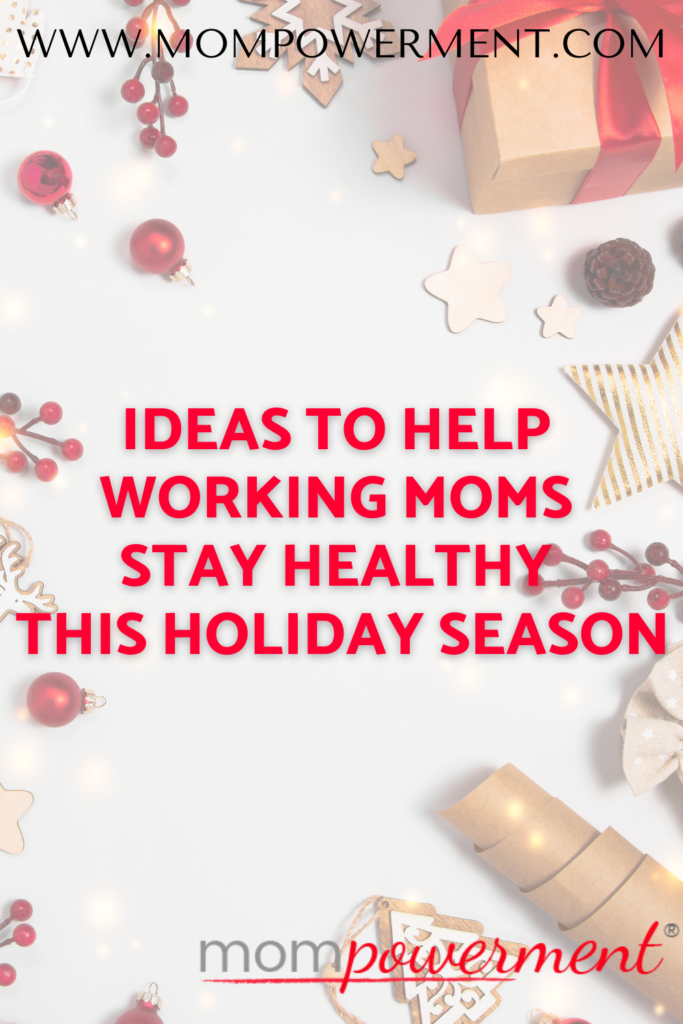
The holidays are in full swing, filled with various social and family events. It’s fun and it can be overwhelming to our bodies and immune systems. As a follow-up to my first Mompowerment article, I’m sharing a few more ideas to help working moms stay healthy during the holidays. This time I’m focusing on gut health, sleep, and vitamin C.
Keep Your Gut Healthy
Remember that your immune system is made up of many interconnecting systems and a large proportion of it is in your digestive tract. It creates a physical barrier to potential infections and supports your immune system. Some of the “helpful” bacteria in the gut can stimulate immune function and activity, contributing to a regulated immune response and increased health.
It makes sense to try to keep our guts healthy. The challenge is that high levels of stress and increased alcohol and sugar intake can all wreak havoc on your gut. So, what can you do? These tips can help:
- Eat Fermented foods. Fermented foods are often rich in the probiotics, the “good” bacteria that help keep us healthy. A daily serving of one of these readily available options will help keep your immunity up: sauerkraut, kombucha, kefir, and sour pickles to name a few. Hint: organic versions of these are much more beneficial, as pesticides used in conventional farming can kill a large proportion of the beneficial bacteria.
- Add Probiotics. Try a good probiotic supplement – quality does matter here. Your local health food store should carry a wide selection of probiotic supplements. Take as directed until you finish the bottle. Some of my favorite brands are Garden of Life,Bio-K Plus, and Elm & Rye.
- Eat prebiotic foods. Prebiotics are the indigestible fibers of a plant that promote growth amongst beneficial gut bacteria. It’s “food” for the healthy bacteria in the gut. Making sure to include prebiotic foods in your daily diet can further support your gut and overall health. Foods that are rich in prebiotics are grains, legumes, fruits, and vegetables. Some options are rye, barley, oats, chickpeas, lentils, bananas, apples, onions, garlic, tomatoes, asparagus, and chicory. Try steel-cut oats for breakfast with half a sliced banana and/or apple chunks, your nuts of choice, and a sprinkle of cinnamon and you’re good to go. Add sliced green onions to your salad. Have apple slices with almond butter for a snack. A steaming cup of chicory is a great caffeine-free option to warm you up.
- Keep regular. Most of us know that constipation can be uncomfortable, but it can also contribute to a compromised immune system and decreased defense to pathogens. In addition to a healthy gut bacteria, there are other dietary steps that can support digestion, including sufficient fiber consumption (US dietary guidelines recommend approximately 25g of fiber for adult women under 50yrs). Add soaked chia or flaxseeds to smoothies or oatmeal. Include other good dietary sources of fiber such as rye bread and oats, vegetables, and fruits (kiwis and prunes are especially helpful with keeping you regular). And remember to stay hydrated.

Get a good night’s sleep
When we’re talking about ideas to help working moms stay healthy during the holidays, we must include sleep. Getting enough sleep, preferably good quality sleep, is essential for optimal health. Studies show sleep deprivation contributes to a decrease in immune cells that directly fight off viral and bacterial infections. The CDC reports that approximately 35% of adults in the US don’t get the recommended 7 hours of sleep per night. More social engagements and at-home responsibilities during the holidays often mean we get even less sleep than usual, so it’s important to make an effort to maximize sleep time and quality where you can.
- Nighttime routine. Try to go to bed at approximately the same time every night, as this helps your body regulate its sleep-wake cycle. Write a “to-do” list for the next day to keep your thoughts relaxed once you’re in bed. Create a relaxing routine in the 1-2 hours before bedtime to help you fall and stay asleep. Have a warm shower. Drink a caffeine-free infusion (Chamomile, Lavender, Valerian and Passionflower teas are often used as sleep aids). Try the 4-7-8 breathing technique once you’re in bed and ready to sleep (breathe in for 4 seconds, hold it in for 7, and then exhale for 8).Limit to 4 breaths when you’re starting out.
- Disconnect before going to bed. Part of that nighttime routine relates to electronic devices. Stay off electronics 1-2 hours before bed as they can interfere with the sleep-wake cycle that helps maintain health. Our body secretes hormones in the morning to make us feel alert and awake and the darkness of night stimulates the pineal gland to secrete the hormone melatonin to induce sleep. Blue light emitted by smartphones, computers, and fluorescent and LED lights has been shown to decrease the amount of melatonin produced, contributing to less and poorer quality sleep. Better yet, keep all electronics out of the bedroom and charge at a central hub in the house. Dim the lights, read on a book or kindle, and use nighttime mode on your phone which is easier on the eyes (but not a 100% effective.)
- Be Active. Regular exercise has been shown to improve both quantity and quality of sleep. Exercise helps reduce the time it takes to fall asleep. It increases the amount of time spent in deep sleep, which is the phase of sleep that restores the immune system. Only 30 minutes of moderate to intense exercise 5 days per week can improve both quantity and quality of sleep. Try to avoid exercise within 2 hours of going to bed as it can interfere with sleep. The benefits of exercise for sleep are best when done consistently over time, so it’s a habit to keep for the long term.
- Cut back on alcohol consumption. Yet another reason to cut down on alcohol consumption is that several studies have shown alcohol consumption to reduce the length and quality of REM sleep. Check out my tips to help cut back on alcohol consumption.
Vitamin C
A balanced diet that includes a wide variety of vitamins and minerals is essential for overall health, but sometimes getting a bit of a boost from supplements is a good idea. Vitamin C has been shown to have antiviral and antimicrobial effects and enhances the function of various types of immune cells. The US UL for vitamin C is 2000mg, and as vitamin C is water-soluble, excess amounts flush from the body. Look for a supplement of about 1000mg of natural sources of vitamin C that also contains bioflavonoids to help with absorption. A quick reminder to try to find high-quality supplements without allergens and fillers. Thorne Research and Garden of Life are two of my favorite brands
At the end of the day, the holidays should be about enjoyment, so make the most of your family and friends, just don’t forget to take care of yourself as well! There are many actionable ideas to help working moms stay healthy during the holidays. What ideas will you start using? What tips do you share to help fellow working moms stay healthy, especially during the holidays?

Amanda Smallwood is a nutritional therapist on a mission to support busy women take control of their health and wellness. She offers 1-to-1 consultations and group workshops (both in-person and online) and collaborates with organizations. She uses a holistic approach to her nutritional therapy practice and strives to provide helpful, actionable tips that women will be able to use based on their lifestyle. Amanda lives in London with her husband, two children, and a very fluffy cat.
Want to read some of the science behind these tips? The information was all found here:
Centre for Disease Control (CDC) (2017) Short Sleep Duration Among US Adults CDC: Sleep and Sleep Disorders (online) last accessed 5 December 2021 at https://www.cdc.gov/sleep/data_statistics.html
Colrain IM Nicholas, C.L. and Baker F C (2014) Alcohol and the sleeping brain Handbook of clinical neurology 125 415-431
Dhabhar FS (2014) Effects of stress on immune function: the good, the bad, and the beautiful Immunologic Research 58 2-3 193-210
Dhabhar FS McEwen BS (1997) Acute stress enhances while chronic stress suppresses immune function in vivo: a potential role for leukocyte trafficking Brain, Behaviour & Immunity 11 286-306
Fields H (2015) The Gut: Where Bacteria and Immune System Meet Johns Hopkins Medical (online) found at: https://www.hopkinsmedicine.org/research/advancements-in-research/fundamentals/in-depth/the-gut-where-bacteria-and-immune-system-meet
Gibson GR Roberfroid MB (1995) Dietary modulation of the human colonic microbiota: introducing the concept of probiotics Journal of Nutrition 125 1401-12 https://academic.oup.com/jn/article-abstract/125/6/1401/4730723
Heiser P Dickhaus B Schreiber W Clement HW Hasse C Hennig J Remschmidt H Krieg JC Wesemann W Opper C (2000) White blood cells and cortisol after sleep deprivation and recovery sleep in humans European Archives of Psychiatry and Clinical Neuroscience 250 1 16-23
Janeway CA Jr Travers P Walport M et al. Immunobiology: The Immune System in Health and Disease. 5th edition. New York: Garland Science; 2001. The mucosal immune system. https://www.ncbi.nlm.nih.gov/books/NBK27169/
Khalif IL Quigley EM Konovitch EA Maximova ID (2005) Alterations in the colonic flora and intestinal permeability and evidence of immune activation in chronic constipation Digestive & Liver Diseases 37 11 838-49
Kuhn KA Stappenbeck TS (2013) Peripheral education of the immune system by the colonic microbiota Seminars in Immunology 25 364-369 https://www.sciencedirect.com/science/article/abs/pii/S1044532313000833
Kline CE (2014) The bidirectional relationship between exercise and sleep: implications for exercise adherence and sleep improvement American journal of lifestyle medicine 8 6 375-379
Lupton JR Brooks JA Butte NF Caballero B Flatt JP Fried SK (2002) Dietary reference intakes for energy, carbohydrate, fiber, fat, fatty acids, cholesterol, protein, and amino acids National Academy Press: Washington, DC, USA 5 589-768
Nagare R Plitnick B and Figueiro MG (2019) Does the iPad Night Shift mode reduce melatonin suppression? Lighting Research & Technology 51(3) 373-383
van Gorkom GNY Klein Wolterink RGJ Van Elssen CHMJ et al (2018) Influence of Vitamin C on Lymphocytes: An Overview Antioxidants (Basel) 7 3 pii: E4


